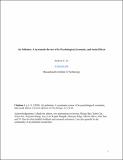Air pollution: A systematic review of its psychological, economic, and social effects
Author(s)
Lu, Jackson G
DownloadAccepted version (452.6Kb)
Open Access Policy
Open Access Policy
Creative Commons Attribution-Noncommercial-Share Alike
Terms of use
Metadata
Show full item recordAbstract
This review (178 published articles) is the first to systematically examine the psychological (affective, cognitive, behavioral), economic, and social effects of air pollution beyond its physiological and environmental effects. Affectively, air pollution decreases happiness and life satisfaction, and increases annoyance, anxiety, mental disorders, self-harm, and suicide. Cognitively, it impairs cognitive functioning and decision making. Behaviorally, air pollution triggers avoidance behavior, defensive expenditure, and migration as coping strategies. Economically, it hurts work productivity and stock markets. Socially, it exacerbates criminal activities and worsens perception of the government. Importantly, both actual and perceived air pollution levels matter. Limitations of past research and future directions are discussed.
Date issued
2020-04Department
Sloan School of ManagementJournal
Current Opinion in Psychology
Publisher
Elsevier BV
Citation
Lu, Jackson G. 2020. "Air pollution: A systematic review of its psychological, economic, and social effects." Current Opinion in Psychology, 32.
Version: Author's final manuscript